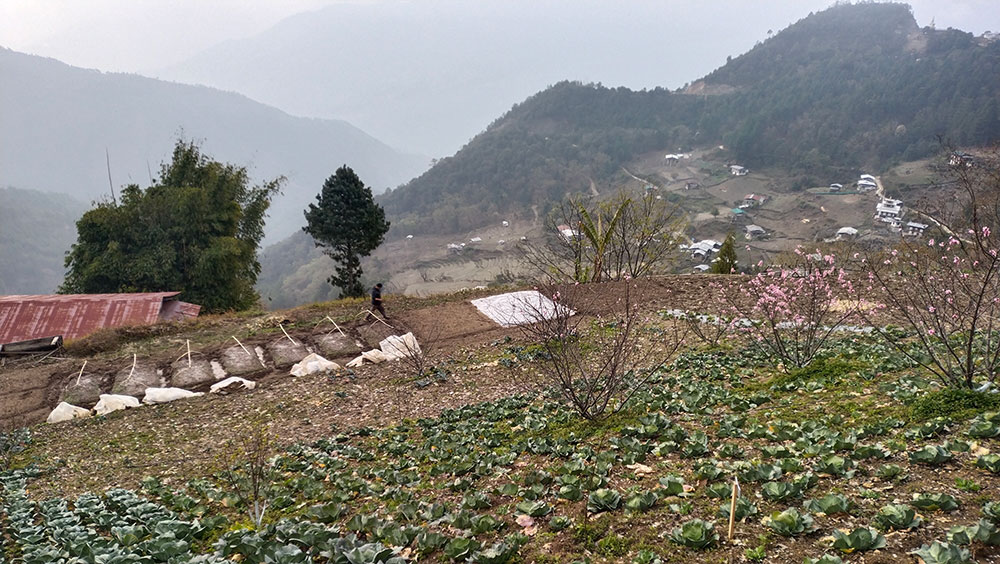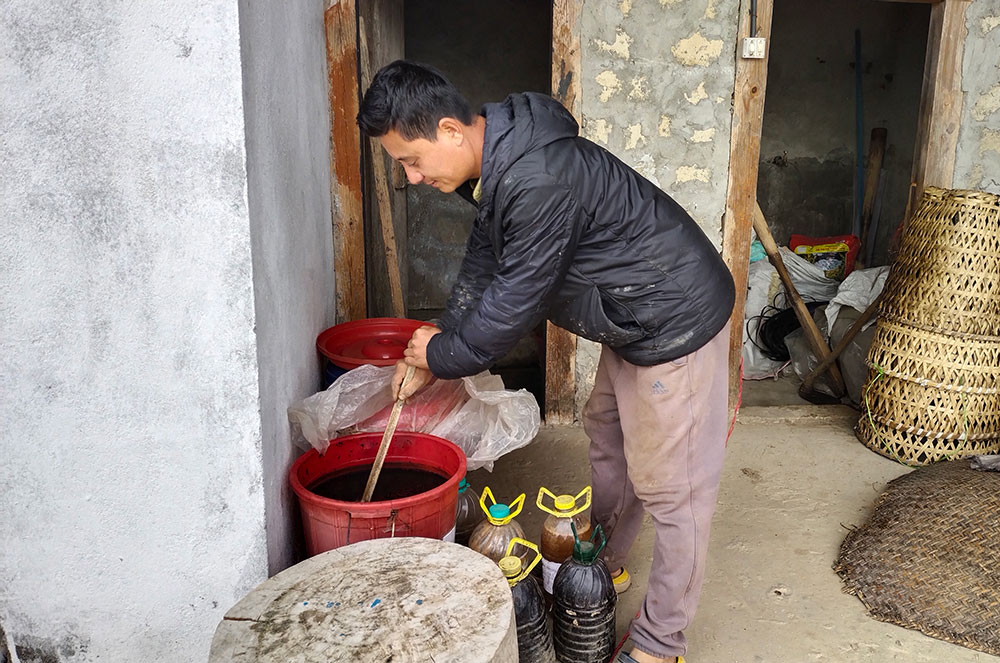Neten Dorji
Trashigang—Jamyang Phuntsho holds freshly harvested cabbage and cauliflower. These nutritious vegetables are grown organically, he declares.
Ecological farming practices are evident in every corner of Jamyang Phuntsho’s farm. Blue and red plastic buckets hold a concoction of animal urine, dung, leaves, and remnants of hot peppers, chicken manure, and eggshell powder—a homemade bio pesticide.
For the past five years, Jamyang has served as an ecological role model for farmers in surrounding villages. With technical support from the Agriculture Research and Development Centre (ARDC) in Wengkhar, Mongar, he began producing biopesticides and implementing them on his farm.

Farmers make bio -pesticides from cow dung, urine, chicken manure, and plants
Jamyang highlighted that farmers in Bartsham have traditionally relied on chemical fertilisers and pesticides to control weeds and enhance crop production.
“I demonstrate to other farmers how to enhance their animal sheds to collect urine for fertilizing their fields, and I teach them the methods of composting and utilizing manure to enrich their soil,” explains Jamyang. “Just last month, a group of farmers from a neighbouring village visited my fields. They were highly impressed by the productivity, even without the need for irrigation.”
Jamyang and his wife are continuously learning. For seven years, they operated as cash crop farmers, cultivating vegetables with the aid of fertilizers. However, in 2019, Jamyang took advantage of an opportunity to attend farmer training. It didn’t take long for him to make the decision to transition to organic farming. Every day, they witness the benefits: a healthier diet for their family and a variety of produce to sell at the market.
“I used to use chemical pesticides in the past, and even though I made money at that time, my heart was not content. Now I feel accountable, and it brings me inner peace,”he claimed.
On the other side, Jamyang, claims that the Bartsham gewog is making every effort to assist organic farming. The primary source of income in this area is farming. As much aid as feasible has been offered by the gewog budget.
Consisting of 10 members, farmers have formed a group called the Happy Farmers Group, which advocates for organic farming in Bartsham. The recent training on the basics of organic farming has also enabled other farmers to learn techniques for improving organic farming practices.
Another farmer, Tandin Tshewang, said the training taught him the process of preparing pesticides and insecticides using local materials such as cow dung, cow urine, pepper, and cover of other fruit materials.
“It is laborious and challenging to make biopesticide production,”said Tandin Tshewang. “These are new concepts for farmers, and not many are keen, though it has many benefits.”
Farmers say they were using urea and phosphate fertilizers that are available in the market. “We used them to kill weeds without realising they also made our land infertile,” said one. “Using those fertilizers, you don’t have to worry as much about any crop failing.”
Challenges
Farmers have plans to stop using chemical fertilizers or pesticides in their crops or vegetables and gradually transition to organic farming. However, many farmers still debate making the switch to organic, fear of lower production.
Cheten Dorji, who is interested in going organic, said relearning how to farm in a way that supports greater biodiversity is exciting.
“Overall production varies a bit, and in some ways is lower than what used to produce. But I believe it will continue to increase over time as we keep learning new things and the land continues to adapt,”he said, adding that there are many challenges.
Happy Farmers Group aims to turn Bartsham village into a producer of organic vegetables in Trashigang.With the support from the Bhutan Foundation they constructed Wood Vinegar Extraction unit to produce organic compounds such as acetic acid, methanol, and phenols, among others to use in the field.
“We are trying to convey the use of biopesticides to other villagers,”said a group member. “Supporting organic farmers with training and budget is necessary, as farmers transition into organic practices.”
Challenges such as insufficient resources to meet their actual needs hinder farmers’ transition to organic farming. It is evident that some local farmers have chosen to abandon pure organic practices, even though they are aware of them.
Gewog Agriculture Extension Officer, Tshewang Norbu said that many farmers are not opting for organic farming due to the high costs involved and the perception of lower production associated with it.
“The haphazard use of chemical fertilizers and pesticides has resulted in deleterious effects on human health as well as declined soil fertility, which has imbalanced natural ecosystems,” said Tshewang Norbu, adding that they are encouraging organic farming.
He said that the Department of Agriculture also encourages farmers to undertake organic farming, and be certified and registered as organic farmers if they are interested.
“Once certified and branded as organic, farm produce will have a better market,” he said.


